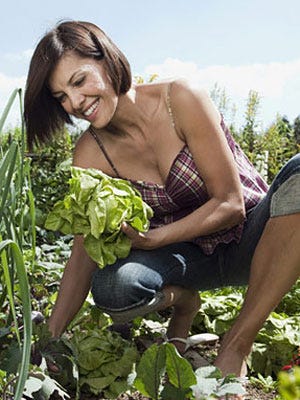How To Grow A Vegetable Garden

Westend61/ Getty Images
Q: I'm determined to grow something this year, but I don't know where to start. Where do I go to find out what will grow best in my backyard?
A: Finances and fitness have led many down a greener path. I decided to seek expert advice from Susan Wells, a former colleague who generously shares apples and tomatoes from her garden. Wells is on the path to becoming a master gardener and has grown enough produce to feed a small nation. Here are her sinfully simple tips to help both of us get started:
Get to know your dirt: To find out what will grow in your neighborhood, Wells suggests contacting the cooperative extension office near you. A division of the Department of Agriculture, extension offices provide expert advice on growing yummy produce. Get your soil tested and find out what nutrients it needs to grow the veggies you like.
Start small: Most vegetables are quite easy to grow, Wells said. Some people are overwhelmed by all the choices, so it's a good thing to start small. A container garden will produce enough lettuce for your family for the entire spring. Or you can focus on herbs such as basil, oregano, thyme, rosemary, tarragon and dill to enhance your dishes all summer. Wells said it's best to grow what your family likes to eat. For her growing boys, that means planting tomatoes, peppers, squash, collards, mustard and turnip greens, asparagus, okra, sweet potatoes, redskin potatoes, leeks, onions, lettuce, arugula, chard, oregano, dill, tarragon, fennel and thyme. (Did I mention that she has a green thumb?) Wells also grows basil for pesto sauce that she freezes and gives as Christmas gifts.
Don't fear fertilizer: Nitrogen is key to healthy soil. This essential nutrient gets used up by plants and has to be replaced every year. Wells said that good organic sources of nitrogen are abundant. When you rake leaves this fall, mow over them with your lawn mower and put them on the spot where you want to garden next year. Not only will they help choke out the grass on that spot, but this super-rich organic material will also help with drainage. Chemical-free grass clippings also are full of nitrogen. But Wells considers hard-working earthworms to be the best soil conditioners. (I'm a little squeamish on this point, but you go crazy.)
Get good garden tools: For a small garden, Wells suggests investing in a spade with a pointed end, a garden fork, a long-tined rake and some hand tools, such as a sturdy trowel. A good pair of gloves also should make the shopping list. Above all, avoid the cheapies — good tools will last a lifetime while cheap versions will simply cause frustration and hinder your progress.
There is power in numbers: As you get more ambitious, Wells suggests renting a plot in a community garden. For a small fee, you can grow anything you want, and benefit from your neighbors' green wisdom.
Happy planting. Hopefully we both will be eating yummy produce we grew with our own two hands!
Related Links:
10 Tips for Organic Gardening with Children
How to Become a Composting Guru
13 Plants That Could Kill You
This content is created and maintained by a third party, and imported onto this page to help users provide their email addresses. You may be able to find more information about this and similar content at piano.io
How To Grow A Vegetable Garden
Source: https://www.womansday.com/home/tips/a4839/vegetable-garden-basics-106234/
Posted by: denhamgoolifter.blogspot.com

0 Response to "How To Grow A Vegetable Garden"
Post a Comment